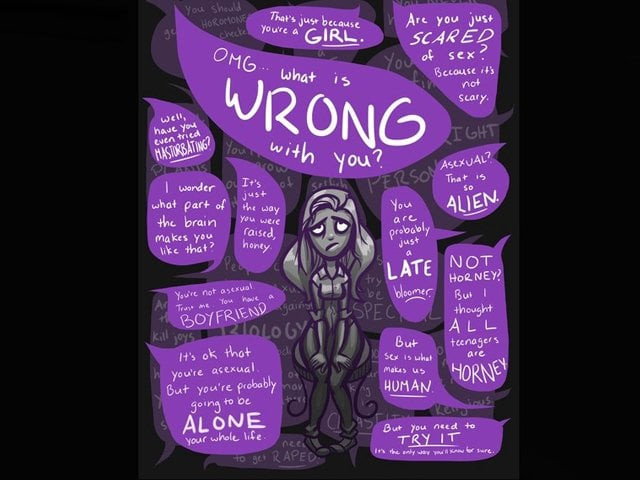My great grandmother had a cousin who spent her whole life single. She had a successful life, to say the least – she was a practicing doctor, she had a wonderful social circle and she indulged in numerous hobbies. And she was really, really content.
Contentment is a strange emotion; you can be happy but not necessarily content. She, however, was tremendously satisfied with her life. She had everything, except a husband, and not because she wasn’t able to find someone, but because she didn’t want one. She had a great upbringing in a moderately liberal family with happily married parents. She was not a victim of abuse or suffering from some form of post-traumatic stress disorder. She didn’t have a bad break-up or a scandalous love affair that went wrong, yet the idea of marriage repulsed her.
The reason for her distaste was less about the actual institution of marriage but more of what came with it – physical intimacy. Marriage meant copulation, intercourse and lovemaking – basically, it meant sex, and she didn’t want anything to do with it. She never admitted to it, perhaps she wasn’t even aware, but I have every reason to believe that she was asexual.
Discussing sexuality in a South Asian household constitutes to immoral behaviour, and if you’re a woman talking about it, you are categorically promiscuous. Since there is no discussion, there is never a need to acknowledge behaviour that contradicts conventions. In this society, you are either heterosexual or you are messed up. There is no recognition of a spectrum; no clear explanation for why a person feels differently, or in this case, feels absolutely nothing. Unlike homosexuality – in which an individual is sexually inclined towards the same sex – that’s grossly surrounded by notions of sin, deviance and criminality, asexuality is still an uncommon concept.
To break down how unheard it really is, the following may give you some perspective.
I was raised in Toronto by comparatively open-minded parents in a multicultural community, attended schools taught mostly by white teachers and professors. I even attended sex-ed, but it wasn’t until the last year of journalism school when a fellow classmate produced a documentary on asexuality that finally enlightened me on the topic.
Asexuality is the lack of sexual desire towards another person. They lack the urge for any form of sexual stimulation. This has no bearing on their ability to perform sexually or in experiencing pleasure; they are completely healthy. They just don’t want to engage in any form of physical intimacy. Asexuality cannot be adopted because that would be called celibacy. It’s important to note here that albeit rare, certain circumstances may trigger certain behaviours, such as a female rape victim developing an aversion towards males or sexual intimacy. But an asexual has never felt a sexual desire in their lifetime and they do not feel deprived.
In fact, any distress they do feel is not because of their sexual orientation but rather from societal pressure. If a man appears to show a lack of sexual interest, he’s labelled as gay or impotent, and if a woman appears to show disinterest, she’s categorised as a disobedient wife at best and mentally ill at worst. There are numerous accounts of asexual individuals who were coerced or emotionally blackmailed into marriages and subsequently, into having children. They describe their sexual interactions as traumatising, unsettling and forceful – adjectives often used by rape victims to describe their ordeal.
Being asexual by no means bars you from loving another person. Many asexual men and women find themselves capable of maintaining romantic relationships that are strictly kept platonic. That means there can be no sexual contact between the couple. The survival of such relationships depends largely on the understanding and cooperation of the non-asexual partner. In our increasingly sexualised societies, this is often difficult to find, where men and women alike are eager to explore sexual boundaries.
The spectrum of sexuality is vast and often fluid, but contrary to popular belief, your sexual orientation is not a decision based simply on choice. A small number of the human population is inherently born with a sexual orientation other than heterosexuality, including transsexual, homosexual and intersexual. Although it’s hard to give a definitive figure, researchers have found that approximately 1% of the population exhibits asexuality.
There is no ‘quick fix’ or ‘solution’ that loving parents, desperately preventing a ‘log kya kahenge’ (what will people say) situation, can initiate to change how their child feels. In fact, they end up doing more harm than good. ‘Conversion therapies’ geared towards changing sexual behaviour use intimidation, physical trauma and psychological abuse to suppress feelings of desire. Since there is no button that can possibly turn our feelings on or off, suppression leads to either a complete surrender (the person is fearful, depressed, reserved) or a destructive rebellion. This is why it is so important to have open, non-judgmental discussions. By creating a safe environment for family and friends to talk in, there may be one less miserable marriage that would have happened, if an amma or abba took the time to just listen.
In a society where you are either heterosexual or just “messed up”, is there any room for asexuals?
Her distaste was more about what comes with marriage – physical intimacy, and she didn’t want anything to do with it.

Any distress they do feel is not because of their sexual orientation but rather from societal pressure. PHOTO: PINTEREST


COMMENTS
Comments are moderated and generally will be posted if they are on-topic and not abusive.
For more information, please see our Comments FAQ